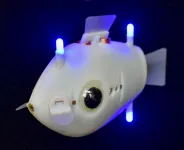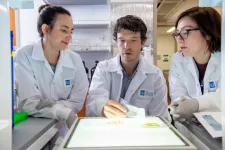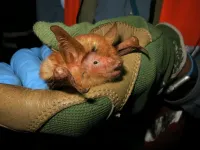(Press-News.org) Schools of fish exhibit complex, synchronized behaviors that help them find food, migrate and evade predators. No one fish or team of fish coordinates these movements nor do fish communicate with each other about what to do next. Rather, these collective behaviors emerge from so-called implicit coordination -- individual fish making decisions based on what they see their neighbors doing.
This type of decentralized, autonomous self-organization and coordination has long fascinated scientists, especially in the field of robotics.
Now, a team of researchers at the Harvard John A. Paulson School of Engineering and Applied Sciences (SEAS) and the Wyss Institute for Biologically Inspired Engineering have developed fish-inspired robots that can synchronize their movements like a real school of fish, without any external control. It is the first time researchers have demonstrated complex 3D collective behaviors with implicit coordination in underwater robots.
"Robots are often deployed in areas that are inaccessible or dangerous to humans, areas where human intervention might not even be possible," said Florian Berlinger, a PhD Candidate at SEAS and Wyss and first author of the paper. "In these situations, it really benefits you to have a highly autonomous robot swarm that is self-sufficient. By using implicit rules and 3D visual perception, we were able to create a system that has a high degree of autonomy and flexibility underwater where things like GPS and WiFi are not accessible."
The research is published in Science Robotics.
The fish-inspired robotic swarm, dubbed Blueswarm, was created in the lab of Radhika Nagpal, the Fred Kavli Professor of Computer Science at SEAS and Associate Faculty Member at the Wyss Institute. Nagpal's lab is a pioneer in self-organizing systems, from their 1,000 robot Kilobot swarm to their termite-inspired robotic construction crew.
However, most previous robotic swarms operated in two-dimensional space. Three-dimensional spaces, like air and water, pose significant challenges to sensing and locomotion.
To overcome these challenges, the researchers developed a vision-based coordination system in their fish robots based on blue LED lights. Each underwater robot, called a Bluebot, is equipped with two cameras and three LED lights. The on-board, fish-lens cameras detect the LEDs of neighboring Bluebots and use a custom algorithm to determine their distance, direction and heading. Based on the simple production and detection of LED light, the researchers demonstrated that the Blueswarm could exhibit complex self-organized behaviors, including aggregation, dispersion and circle formation.
"Each Bluebot implicitly reacts to its neighbors' positions," said Berlinger. "So, if we want the robots to aggregate, then each Bluebot will calculate the position of each of its neighbors and move towards the center. If we want the robots to disperse, the Bluebots do the opposite. If we want them to swim as a school in a circle, they are programmed to follow lights directly in front of them in a clockwise direction. "
The researchers also simulated a simple search mission with a red light in the tank. Using the dispersion algorithm, the Bluebots spread out across the tank until one comes close enough to the light source to detect it. Once the robot detects the light, its LEDs begin to flash, which triggers the aggregation algorithm in the rest of the school. From there, all the Bluebots aggregate around the signaling robot.
"Our results with Blueswarm represent a significant milestone in the investigation of underwater self-organized collective behaviors," said Nagpal. "Insights from this research will help us develop future miniature underwater swarms that can perform environmental monitoring and search in visually-rich but fragile environments like coral reefs. This research also paves a way to better understand fish schools, by synthetically recreating their behavior."
INFORMATION:
The research was co-authored by Dr. Melvin Gauci, a former Wyss Technology Development Fellow. It was supported in part by the Office of Naval Research, the Wyss Institute for Biologically Inspired Engineering, and an Amazon AWS Research Award.
Philadelphia, January 13, 2021--Researchers at Children's Hospital of Philadelphia and the School of Engineering and Applied Science at the University of Pennsylvania have identified ionizable lipid nanoparticles that could be used to deliver mRNA as part of fetal therapy. The proof-of-concept study, published today in Science Advances, engineered and screened a number of lipid nanoparticle formulations for targeting mouse fetal organs and has laid the groundwork for testing potential therapies to treat genetic diseases before birth.
"This is an important first step in identifying nonviral mediated approaches for delivering cutting-edge therapies before birth," said co-senior author William H. Peranteau, MD, an attending surgeon in the Division of ...
PHILADELPHIA -- (Jan. 13, 2021) -- Scientists at The Wistar Institute discovered that Early Growth Response 1 (EGR1), a protein that turns on and off specific genes during blood cell development, inhibits expression of pro-inflammatory genes in macrophages. As part of their function to protect the body against pathogens, macrophages play a major role in initiation, maintenance, and resolution of inflammation. The discovery expands the understanding of how macrophages are set off and deactivated in the inflammatory process, which is critical in many normal and pathological conditions. These findings were published online in the journal Science Advances.
"By deepening the understanding of the role of EGR1, we ...
COLUMBUS, Ohio - While we wait for our turn to get vaccinated against SARS-CoV-2, we could - and probably should - use the time to make sure we bring our healthiest emotional and physical selves to the treatment, a new review of previous research suggests.
Ohio State University researchers reviewed 49 vaccine studies in humans dating back 30 years that document how stress, depression and poor health behaviors can negatively affect the body's immune response to vaccination, and how improving health factors can enhance that response.
The impaired immune responses tended to fall into three categories - interference with the ...
Skoltech researchers have found a way to use chemical sensors and computer vision to determine when grilled chicken is cooked just right. These tools can help restaurants monitor and automate cooking processes in their kitchens, and perhaps one day even end up in your 'smart' oven. The paper detailing this research results, supported by a Russian Science Foundation grant, was published in the journal Food Chemistry.
How do you tell that chicken breast on your grill is ready for your plate? You probably look at it closely and smell it to make sure it is done the way you like it. However, if you are a restaurant chef or head cook at a huge industrial ...
Scientists tame photon-magnon interaction.
Working with theorists in the University of Chicago's Pritzker School of Molecular Engineering, researchers in the U.S. Department of Energy's (DOE) Argonne National Laboratory have achieved a scientific control that is a first of its kind. They demonstrated a novel approach that allows real-time control of the interactions between microwave photons and magnons, potentially leading to advances in electronic devices and quantum signal processing.
Microwave photons are elementary particles forming the electromagnetic waves that we use for wireless communications. On the other hand, magnons are the elementary particles forming what scientists call "spin waves" -- wave-like disturbances in ...
In a study in mice and human cells, Johns Hopkins Medicine researchers say that they have developed a tiny, yet effective method for preventing premature birth. The vaginally-delivered treatment contains nanosized (billionth of a meter) particles of drugs that easily penetrate the vaginal wall to reach the uterine muscles and prevent them from contracting. If proven effective in humans, the treatment could be one of the only clinical options available to prevent preterm labor. The FDA has recommended removing Makena (17-hydroxyprogesterone caproate), the only approved medicine for this purpose, from the market.
The study was published Jan. 13 in Science Translational Medicine.
There ...
A group of scientists led by the American Museum of Natural History and Bat Conservation International have discovered a new species of a striking orange and black bat in a mountain range in West Africa. The species, which the researchers expect is likely critically endangered, underscores the importance of sub-Saharan "sky islands" to bat diversity. The species is described today in the journal American Museum Novitates.
"In an age of extinction, a discovery like this offers a glimmer of hope," said Winifred Frick, chief scientist at Bat Conservation International and ...
With the impact of climate change increasing by the day, scientists are studying the ways in which human behavior contributes to the damage. A recent study at Walla Walla University, by a collaboration of researchers from Walla Walla University and La Sierra University, examined the effects of acidic water on octopuses, potentially bringing new insight into both how our activities impact the world around us, and the way that world is adapting in response.
The study, "Impact of Short- and Long-Term Exposure to Elevated Seawater PCO2 on Metabolic Rate ...
The human organism requires a variety of small molecules, such as sugars or fats, in order to function properly. The composition of these so-called metabolites and their interaction - the metabolism - varies from person to person and is dependent not only on external influences, such as nutrition, but also to a significant extent on natural variations in our genetic make-up. In an international study, scientists from the Berlin Institute of Health (BIH) and Charité - Universitätsmedizin Berlin joined forces with colleagues from the United Kingdom, Australia and the United States and discovered hundreds ...
A new study from UBC researchers suggests a strong correlation between following the MIND and Mediterranean diets and later onset of Parkinson's disease (PD). While researchers have long known of neuroprotective effects of the MIND diet for diseases like Alzheimer's and dementia, this study is the first to suggest a link between this diet and brain health for Parkinson's disease (PD).
The MIND diet combines aspects of two very popular diets, the Mediterranean diet and the Dietary Approaches to Stop Hypertension (DASH) diet.
"The study shows individuals with Parkinson's disease have a significantly later age of onset if their eating pattern closely aligns with the Mediterranean-type diet. The difference shown in the study was up to 17 years later in women and eight years later ...





